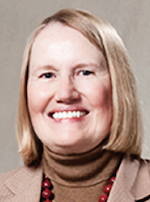Norsetter retires after distinguished federal relations career
Rhonda Norsetter arrived on the UW–Madison campus as a student in 1964. Nearly 50 years later, she leaves as one of the most respected federal relations officers in American higher education.

Rhonda Norsetter
Photo courtesy of Madison Magazine
“It never felt like a lot of years to me,” says Norsetter, whose official title is Senior Special Assistant to the Chancellor and Director of Federal Relations. “I’ve always enjoyed it.”
Since 1992, Norsetter has occupied a well-concealed office in Bascom Hall, tucked into the hill below the Office of the Chancellor. Her impact on campus life, however, has been substantially more visible. At least once a month, she has traveled to Washington, D.C. to represent the university’s interests with Wisconsin’s senators, representatives and staff, as well as national higher education organizations.
More than 30 percent of UW–Madison’s overall budget comes from federal programs. Thirty-five percent of all financial aid grants, as well as a whopping 90 percent of loans and work-study money, come from federal aid.
“Every single day I’ve worked here, I’ve learned something new and important about the university that I didn’t know the day before. That speaks to the breadth, the enormity of what we’re doing, and its importance. The operative word is pride.”
Rhonda Norsetter
Given the critical nature of these funds, Norsetter’s work has affected nearly every part of the UW–Madison community.
“Since I first became chancellor in 1993, Rhonda has been an invaluable ally,” says interim chancellor David Ward, whose own retirement coincides with Norsetter’s. “Federal funding impacts every student on this campus, so it’s impossible to overstate the importance of a careful, thorough liaison who can advocate for our university’s interests. Rhonda has done that, and much more.”
As the leader of the American Council on Education for nearly 10 years, Ward lived and worked in Washington, representing the presidents of U.S. degree-granting institutions. Working closely with federal higher education policy, he saw Norsetter’s work from a different angle.
“She has set a standard for colleagues across the country,” says Ward. “Thanks to her breadth of personal knowledge and advocacy, Wisconsin has gained even more respect in the national policy arena.”
Norsetter’s professional career began in 1968 at the Office of Student Financial Aid. Over the next 23 years, she worked her way up to an associate director position.
Interested in a broader scope, she took on two fellowships, including three months at the University of Virginia with then-president John Casteen. The two had co-chaired the National Association of Student Financial Aid Administrators’ Task Force on Institutional Leadership, which helped produce an award-winning national report on student financial aid.
“Federal funding impacts every student on this campus, so it’s impossible to overstate the importance of a careful, thorough liaison who can advocate for our university’s interests. Rhonda has done that, and much more.”
David Ward
“Donna Shalala was chancellor in 1992, and she had heard about me external to the campus,” Norsetter recalls. “At the time, I was in student financial aid administration, and was holding national offices. She wanted that knowledge on her staff, and thought that my reputation would be valuable.”
As she speaks, Norsetter represents herself and her interests with care, occasionally rechecking her statements for clarity and balance. It’s a skill she’s had to hone over many years, building relationships with vastly different governmental and educational factions.
Over the years, collaborations with peer universities through organizations such as the Association of American Universities (AAU) have become an important part of collective lobbying. Norsetter has taken an active role, chairing AAU subgroups (among others) such as the Council of Federal Relations.
“It’s not enough for one of us to work with our own delegations,” she says, describing the “army of colleagues” she has built across the country. “Issues of funding for something like the NIH [National Institutes of Health, which supports many campus research projects] impacts all of us. If we’re all saying roughly the same thing to members of Congress across the country, the message is heard more broadly and becomes more effective.”
Former Chancellor John Wiley, describing Norsetter as “spectacularly successful,” considers this one of her top skills. He cites Norsetter’s role in helping UW–Madison secure funding as lead institution for the IceCube project, creating a neutrino observatory deep in the Antarctic ice.
“I had the privilege of working closely with her for 24 years in Washington, D.C. on federal issues that both promoted and protected the Wisconsin Idea. Her leadership, intelligence and influence will be missed.”
Herb Kohl
“It’s probably the biggest project we’ve ever landed — around $250 million,” says Wiley. “This is a multi-institute collaboration, so she made sure that other states’ senators and representatives knew what was at stake. She found out exactly how it would benefit their states and universities. She went to every one.”
Norsetter’s advocacy for the sciences has helped UW–Madison remain among the top five universities in research expenditures over the past 20 years. Fifty-three percent of the university’s total research funds come from federal money.
Her work often spans multiple constituencies. When research with human embryonic stem cells faced opposition, she led the charge to bring researchers, universities, physicians and patient coalitions together as co-advocates. She knew the importance of putting a human face on the potential impact of federal regulation.
Through her careful attention to detail — both professional and personal — Norsetter gained a reputation as a “dean” of federal relations officers among AAU member universities.
“Part of it’s her wonderful personal affect, even when she meets with newer staffers to a member of Congress,” says Matt Owens, vice president for federal relations at AAU. “By sharing the information that they need, walking them through it, she’s provided them with an instant relationship to UW–Madison.”
Wiley joined Norsetter in Washington at least twice a year to visit members of the Wisconsin delegation. Thanks to these “instant relationships,” she and Wiley found an enthusiastic welcome in each office.
“She opened all those doors and made me welcome too — which is all you can ask for,” says Wiley.
After 45 years in service to the students, faculty and staff of UW–Madison, simply sharing the news of Norsetter’s retirement will take a while. She has made indelible marks on the AAU, the halls of Congress and especially the university itself — just as UW–Madison has left its imprint on her.
“Every single day I’ve worked here, I’ve learned something new and important about the university that I didn’t know the day before,” says Norsetter. “That speaks to the breadth, the enormity of what we’re doing, and its importance. The operative word is ‘pride.'”
The university plans to move forward quickly in a search for Norsetter’s successor, but expects to appoint an interim director in the meantime.
What others say about Rhonda Norsetter:
“Throughout her time at UW–Madison, Rhonda Norsetter has been a model public servant for a model public university. I had the privilege of working closely with her for 24 years in Washington, D.C. on federal issues that both promoted and protected the Wisconsin Idea. Her leadership, intelligence and influence will be missed.”
—Herb Kohl, U.S. Senator (retired) and UW alumnus
“Rhonda is a true professional: thoughtful, well informed and well respected in Washington. She has been a superb representative of UW–Madison.”
—Donna E. Shalala
Former Chancellor, UW–Madison
Current President, University of Miami
“We’ve had struggles in Washington with patent reform laws, and other things affecting our research. Rhonda’s always been there for us. She really thinks through processes and unintended consequences of various actions before you can think of them yourself.”
—Carl Gulbrandsen
Managing Director, Wisconsin Alumni Research Foundation (WARF)


